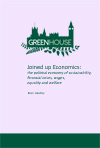Post-Growth Project: an introduction (Green House)
What is ‘Growth’ for and can we afford it?: A critical twenty-first-century assessment of the hegemonic economic policy of our time
Rupert Read / Green House / 2012
 At a time of low economic growth in the United Kingdom (and much of the Eurozone) the predominant focus is on boosting economic growth to pre-2008 financial crisis levels. This introduction to the Green House think tank ‘post‐growth’ project asks: “what if further growth is impossible, or undesirable, or both?”.
At a time of low economic growth in the United Kingdom (and much of the Eurozone) the predominant focus is on boosting economic growth to pre-2008 financial crisis levels. This introduction to the Green House think tank ‘post‐growth’ project asks: “what if further growth is impossible, or undesirable, or both?”.
The project will question the current obsession with the size of the economy and whether it is growing. It asks “What if the hegemonic assumption that we need to return the economy to a state of growth is wrong?”. The project seeks to show that “alternatives to the false objectives of growth and austerity” are “necessary, possible and desirable”.
Why is a post-growth economy needed? The Green House research will look at the risk of continuing ‘growth mania’ which has seen the current economic growth model already pushing past planetary limits. They argue a shift is needed to a dynamic economy which deliberately reduces its use of resources over the long-term to reach a ‘sustainable’ level. This will ensure a healthy environment for future generations to live in.
This project is orientated towards the United Kingdom and other countries in broadly similar positions. It aims to show life would be better in a post-growth Britain. It will build on the work of Herman Daly on a ‘steady-state’ economy. This would then create more ‘space’ for developing countries to improve the material progress of their populations.
Selected quotes from the briefing
“Is economic growth now anything other than the production of more that we don’t need and don’t even really want, through overly hard work, and at the cost of despoiling our shared planetary home beyond repair?”
“One of the deepest harms done by the ideology of economic growth is its endless deferral of the quest for a more equal society. ‘A bigger pie for everyone’ has prevented us from thinking clearly about sharing a pie that can be sustainably produced, a pie of a fixed size, a pie that doesn’t mean less pie for future people. As Herman Daly has put it, “is not the solution to poverty to be found in sharing now, rather than in the empty promise of growth in the future?”
“The question is really one of quality versus quantity. The growthist status quo maintains that economic growth is always desirable, that those numbers need to keep going up. It assumes that more stuff, more economic activity, etc., is what we need. By contrast, we think that what matters is quality, not quantity. We want to offer people a better life. A life that is based on having fewer material possessions and less formal economic activity, but more well-being, more community, more security, and much more of what Ivan Illich rightly called ‘conviviality’. More real wealth.”
“One of the deep re-definitions that will be accomplished, then, will be of ‘wealth’”.
Read briefing
————————————
Joined up Economics: The Political Economy of Sustainability, Financial Crises, Wages, Equality and Welfare (Green House)
Brian Heatley / Green House / 2012
 This report looks at the future of GDP growth in the UK. The key message is “growth is not the answer: it is neither possible because of the financial and environmental crises, and neither necessary nor desirable in terms of improving welfare”
This report looks at the future of GDP growth in the UK. The key message is “growth is not the answer: it is neither possible because of the financial and environmental crises, and neither necessary nor desirable in terms of improving welfare”
“The resource and environmental limits to growth mean that growth in material throughput in the world economy will end in the next 10-15 years.
“With the end of growth, the share of wages in GDP versus profits will matter more than ever”.
“The alternative is to invest heavily for the next few years in non-fossil fuel energy resources, introduce controls on credit, gradually shorten the working week initially without wage reductions to both prevent unemployment and raise the share of wages and reduce inequality, and limit the use of materials”.
It concludes:
1) “The era of real GDP growth is over forever, at least in the medium and long term. It will not return, whatever demand side economic policies we adopt”
2) “One major effect on our politics is that the issue of inequality will no longer be obscured by growth. It will no longer be a matter of fighting over the increase in the size of the cake. We will fight over the cake itself, and the battle will become a zero sum game”
3) “There is no real (as against rhetorical) conflict as some in the environmental movement have feared between stimulating the economy now with green investment, particularly in energy infrastructure, and preparing for a longer term reduction in the real size of the economy.”
Read report
————————————
See also: Green House response to United Kingdom Green Economy Inquiry by Environmental Audit Committee (2011)
“This year marks the centenary of the birth of E. F. Schumacher: in the 36 years since he published Small is Beautiful we have seen an acceleration of species loss, rapidly rising carbon emissions, and the depletion of a range of essential resources. Over the past few years the issue of climate change has moved from a peripheral concern of scientists and environmentalists to being a central issue in global policy-making. This is but one of many indications that our economy is in fundamental conflict with our ecological systems; it was these indications that stimulated the development of a green approach to the economy.”
Read Green House response
————————————
This summary was prepared by Why Green Economy?. The views expressed have been paraphrased. See the original source for more information.

Leave a Reply